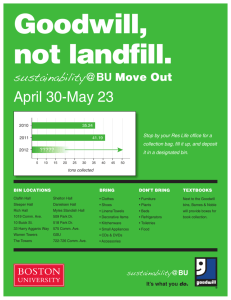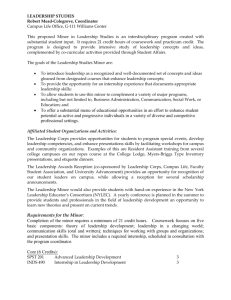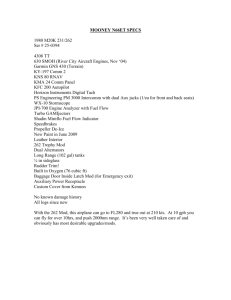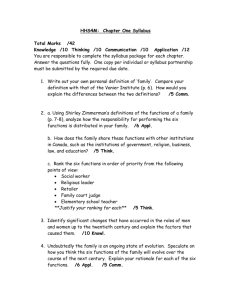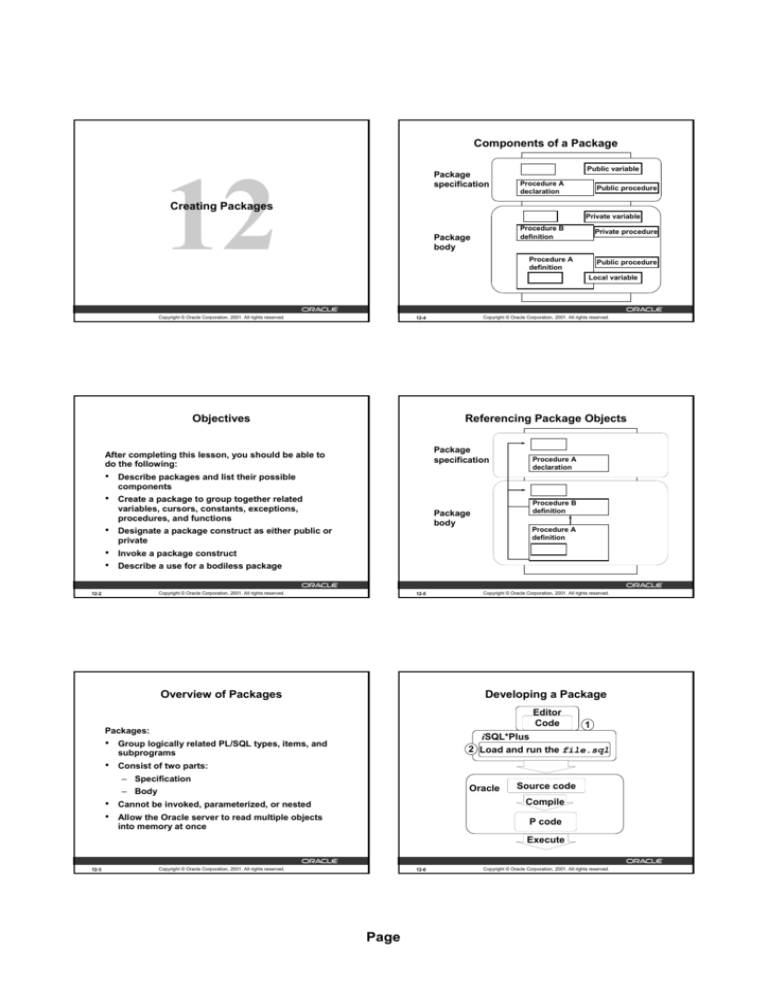
Components of a Package
Package
specification
12
Public variable
Procedure A
declaration
Public procedure
Creating Packages
Private variable
Procedure B
definition
Package
body
Procedure A
definition
Private procedure
Public procedure
Local variable
Copyright © Oracle Corporation, 2001. All rights reserved.
Objectives
Referencing Package Objects
Package
specification
After completing this lesson, you should be able to
do the following:
•
Describe packages and list their possible
components
•
Create a package to group together related
variables, cursors, constants, exceptions,
procedures, and functions
•
Designate a package construct as either public or
private
•
•
Invoke a package construct
Copyright © Oracle Corporation, 2001. All rights reserved.
12-4
Procedure B
definition
Package
body
Procedure A
definition
Describe a use for a bodiless package
Copyright © Oracle Corporation, 2001. All rights reserved.
12-2
12-5
Overview of Packages
Copyright © Oracle Corporation, 2001. All rights reserved.
Developing a Package
Editor
Code
1
iSQL*Plus
2 Load and run the file.sql
Packages:
•
Group logically related PL/SQL types, items, and
subprograms
•
Consist of two parts:
– Specification
Oracle
– Body
•
•
Procedure A
declaration
Source code
Compile
Cannot be invoked, parameterized, or nested
Allow the Oracle server to read multiple objects
into memory at once
P code
Execute
12-3
Copyright © Oracle Corporation, 2001. All rights reserved.
12-6
Page
Copyright © Oracle Corporation, 2001. All rights reserved.
Developing a Package
•
•
Creating a Package Specification:
Example
Saving the text of the CREATE PACKAGE statement
in two different SQL files facilitates later
modifications to the package.
CREATE OR REPLACE PACKAGE comm_package IS
g_comm NUMBER := 0.10; --initialized to 0.10
PROCEDURE reset_comm
(p_comm
IN NUMBER);
END comm_package;
/
A package specification can exist without a
package body, but a package body cannot exist
without a package specification.
•
•
Copyright © Oracle Corporation, 2001. All rights reserved.
12-7
G_COMM is a global variable and is initialized to 0.10.
RESET_COMM is a public procedure that is
implemented in the package body.
Copyright © Oracle Corporation, 2001. All rights reserved.
12-10
Creating the Package Specification
Creating the Package Body
Syntax:
Syntax:
CREATE [OR REPLACE] PACKAGE package_name
IS|AS
public type and item declarations
subprogram specifications
END package_name;
12-8
CREATE [OR REPLACE] PACKAGE BODY package_name
IS|AS
private type and item declarations
subprogram bodies
END package_name;
•
The REPLACE option drops and recreates the
package specification.
•
The REPLACE option drops and recreates the
package body.
•
Variables declared in the package specification are
initialized to NULL by default.
•
•
All the constructs declared in a package
specification are visible to users who are granted
privileges on the package.
Identifiers defined only in the package body are
private constructs. These are not visible outside
the package body.
•
All private constructs must be declared before
they are used in the public constructs.
Copyright © Oracle Corporation, 2001. All rights reserved.
Copyright © Oracle Corporation, 2001. All rights reserved.
12-11
Declaring Public Constructs
Public and Private Constructs
COMM_PACKAGE package
COMM_PACKAGE package
G_COMM
Package
specification
12-9
RESET_COMM
procedure
declaration
Package
specification
1
2
Package
body
Copyright © Oracle Corporation, 2001. All rights reserved.
12-12
Page
G_COMM
1
RESET_COMM
procedure declaration
2
VALIDATE_COMM
function definition
3
RESET_COMM
procedure definition
2
Copyright © Oracle Corporation, 2001. All rights reserved.
Creating a Package Body: Example
Invoking Package Constructs
comm_pack.sql
Example 2: Invoke a package procedure from iSQL*Plus.
CREATE OR REPLACE PACKAGE BODY comm_package
IS
FUNCTION validate_comm (p_comm IN NUMBER)
RETURN BOOLEAN
IS
v_max_comm
NUMBER;
BEGIN
SELECT
MAX(commission_pct)
INTO
v_max_comm
FROM
employees;
IF
p_comm > v_max_comm THEN RETURN(FALSE);
ELSE
RETURN(TRUE);
END IF;
END validate_comm;
...
12-13
EXECUTE comm_package.reset_comm(0.15)
Example 3: Invoke a package procedure in a different
schema.
EXECUTE scott.comm_package.reset_comm(0.15)
Example 4: Invoke a package procedure in a remote
database.
EXECUTE comm_package.reset_comm@ny(0.15)
Copyright © Oracle Corporation, 2001. All rights reserved.
Copyright © Oracle Corporation, 2001. All rights reserved.
12-16
Creating a Package Body: Example
Declaring a Bodiless Package
comm_pack.sql
CREATE OR REPLACE PACKAGE global_consts IS
mile_2_kilo
CONSTANT NUMBER := 1.6093;
kilo_2_mile
CONSTANT NUMBER := 0.6214;
yard_2_meter
CONSTANT NUMBER := 0.9144;
meter_2_yard
CONSTANT NUMBER := 1.0936;
END global_consts;
/
PROCEDURE reset_comm (p_comm
IN NUMBER)
IS
BEGIN
IF validate_comm(p_comm)
THEN
g_comm:=p_comm; --reset global variable
ELSE
RAISE_APPLICATION_ERROR(-20210,'Invalid commission');
END IF;
END reset_comm;
END comm_package;
/
12-14
EXECUTE DBMS_OUTPUT.PUT_LINE('20 miles = '||20*
global_consts.mile_2_kilo||' km')
Copyright © Oracle Corporation, 2001. All rights reserved.
Invoking Package Constructs
Referencing a Public Variable from
a Stand-Alone Procedure
Example 1: Invoke a function from a procedure within
the same package.
Example:
CREATE OR REPLACE PROCEDURE meter_to_yard
(p_meter IN NUMBER, p_yard OUT NUMBER)
IS
BEGIN
p_yard := p_meter * global_consts.meter_2_yard;
END meter_to_yard;
/
VARIABLE yard NUMBER
EXECUTE meter_to_yard (1, :yard)
PRINT yard
CREATE OR REPLACE PACKAGE BODY comm_package IS
. . .
PROCEDURE reset_comm
(p_comm IN NUMBER)
IS
BEGIN
IF validate_comm(p_comm)
THEN g_comm := p_comm;
ELSE
RAISE_APPLICATION_ERROR
(-20210, 'Invalid commission');
END IF;
END reset_comm;
END comm_package;
12-15
Copyright © Oracle Corporation, 2001. All rights reserved.
12-17
Copyright © Oracle Corporation, 2001. All rights reserved.
12-18
Page
Copyright © Oracle Corporation, 2001. All rights reserved.
Removing Packages
Advantages of Packages
To remove the package specification and the body,
use the following syntax:
DROP PACKAGE package_name;
•
Added functionality: Persistency of variables
and cursors
•
Better performance:
– The entire package is loaded into memory
when the package is first referenced.
To remove the package body, use the following syntax:
– There is only one copy in memory for all users.
DROP PACKAGE BODY package_name;
– The dependency hierarchy is simplified.
•
Copyright © Oracle Corporation, 2001. All rights reserved.
12-19
Overloading: Multiple subprograms of the
same name
Copyright © Oracle Corporation, 2001. All rights reserved.
12-22
Guidelines for Developing Packages
Summary
•
•
•
Construct packages for general use.
In this lesson, you should have learned how to:
Define the package specification before the body.
•
The package specification should contain only
those constructs that you want to be public.
Improve organization, management, security, and
performance by using packages
•
•
Place items in the declaration part of the package
body when you must maintain them throughout
a session or across transactions.
Group related procedures and functions together
in a package
•
Change a package body without affecting a
package specification
•
Grant security access to the entire package
•
Changes to the package specification require
recompilation of each referencing subprogram.
•
The package specification should contain as few
constructs as possible.
Copyright © Oracle Corporation, 2001. All rights reserved.
12-20
Copyright © Oracle Corporation, 2001. All rights reserved.
12-23
Advantages of Packages
Summary
•
•
Modularity: Encapsulate related constructs.
In this lesson, you should have learned how to:
Easier application design: Code and compile
specification and body separately.
Hide the source code from users
•
•
•
Hiding information:
•
•
Reduce disk access for subsequent calls
– Only the declarations in the package
specification are visible and accessible to
applications.
Load the entire package into memory on the
first call
Provide identifiers for the user session
– Private constructs in the package body are
hidden and inaccessible.
– All coding is hidden in the package body.
12-21
Copyright © Oracle Corporation, 2001. All rights reserved.
12-24
Page
Copyright © Oracle Corporation, 2001. All rights reserved.
Summary
Task
Command
CREATE [OR REPLACE] PACKAGE Create (or modify) an existing
package specification
CREATE [OR REPLACE] PACKAGE Create (or modify) an existing
BODY
package body
DROP PACKAGE
Remove both the package
specification and the package body
DROP PACKAGE BODY
Remove the package body only
Copyright © Oracle Corporation, 2001. All rights reserved.
12-25
Practice 12 Overview
This practice covers the following topics:
•
•
12-26
Creating packages
Invoking package program units
Copyright © Oracle Corporation, 2001. All rights reserved.
Page
Objectives
After completing this lesson, you should be able to
do the following:
13
More Package Concepts
Copyright © Oracle Corporation, 2001. All rights reserved.
•
•
Write packages that use the overloading feature
•
•
Initialize variables with a one-time-only procedure
Describe errors with mutually referential
subprograms
Identify persistent states
Copyright © Oracle Corporation, 2001. All rights reserved.
13-2
Overloading
Overloading: Example
over_pack.sql
•
Enables you to use the same name for different
subprograms inside a PL/SQL block, a
subprogram, or a package
•
Requires the formal parameters of the
subprograms to differ in number, order, or data
type family
•
Enables you to build more flexibility because a
user or application is not restricted by the specific
data type or number of formal parameters
CREATE OR REPLACE PACKAGE over_pack
IS
PROCEDURE add_dept
(p_deptno IN departments.department_id%TYPE,
p_name IN departments.department_name%TYPE
DEFAULT 'unknown',
p_loc IN departments.location_id%TYPE DEFAULT 0);
PROCEDURE add_dept
(p_name IN departments.department_name%TYPE
DEFAULT 'unknown',
p_loc IN departments.location_id%TYPE DEFAULT 0);
END over_pack;
/
Note: Only local or packaged subprograms can be
overloaded. You cannot overload stand-alone
subprograms.
13-3
Copyright © Oracle Corporation, 2001. All rights reserved.
Copyright © Oracle Corporation, 2001. All rights reserved.
13-5
Overloading: Example
Overloading: Example
over_pack_body.sql
CREATE OR REPLACE PACKAGE BODY over_pack IS
PROCEDURE add_dept
(p_deptno IN departments.department_id%TYPE,
p_name IN departments.department_name%TYPE DEFAULT 'unknown',
p_loc IN departments.location_id%TYPE DEFAULT 0)
IS
BEGIN
INSERT INTO departments (department_id,
department_name, location_id)
VALUES (p_deptno, p_name, p_loc);
END add_dept;
PROCEDURE add_dept
(p_name IN departments.department_name%TYPE DEFAULT 'unknown',
p_loc IN departments.location_id%TYPE DEFAULT 0)
IS
BEGIN
INSERT INTO departments (department_id,
department_name, location_id)
VALUES (departments_seq.NEXTVAL, p_name, p_loc);
END add_dept;
END over_pack;
/
13-6
Copyright © Oracle Corporation, 2001. All rights reserved.
•
•
Most built-in functions are overloaded.
For example, see the TO_CHAR function of the
STANDARD package.
FUNCTION
FUNCTION
FUNCTION
FUNCTION
•
13-7
TO_CHAR
TO_CHAR
TO_CHAR
TO_CHAR
(p1
(p2
(p1
(p1
DATE) RETURN VARCHAR2;
NUMBER) RETURN VARCHAR2;
DATE, P2 VARCHAR2) RETURN VARCHAR2;
NUMBER, P2 VARCHAR2) RETURN VARCHAR2;
If you redeclare a built-in subprogram in a PL/SQL
program, your local declaration overrides the
global declaration.
Copyright © Oracle Corporation, 2001. All rights reserved.
<Course name> <Lesson number>-
Using Forward Declarations
You must declare identifiers before referencing them.
CREATE OR REPLACE PACKAGE BODY forward_pack
IS
PROCEDURE award_bonus(. . .)
IS
BEGIN
calc_rating(. . .);
--illegal reference
CREATE OR REPLACE PACKAGE BODY forward_pack
IS
PROCEDURE calc_rating(. . .);
END;
PROCEDURE award_bonus(. . .)
IS
BEGIN
calc_rating(. . .);
. . .
END;
PROCEDURE calc_rating(. . .)
IS
BEGIN
...
END;
PROCEDURE calc_rating(. . .)
IS
BEGIN
. . .
END;
END forward_pack;
/
-- subprograms defined
-- in alphabetical order
Copyright © Oracle Corporation, 2001. All rights reserved.
13-9
Creating a One-Time-Only Procedure
Restrictions on Package Functions
Used in SQL
CREATE OR REPLACE PACKAGE taxes
IS
tax
NUMBER;
... -- declare all public procedures/functions
END taxes;
/
A function called from:
• A query or DML statement can not end the current
transaction, create or roll back to a savepoint, or
ALTER the system or session.
•
CREATE OR REPLACE PACKAGE BODY taxes
IS
... -- declare all private variables
... -- define public/private procedures/functions
BEGIN
SELECT
rate_value
INTO
tax
FROM
tax_rates
WHERE
rate_name = 'TAX';
END taxes;
/
13-10
-- forward declaration
END forward_pack;
/
Copyright © Oracle Corporation, 2001. All rights reserved.
13-8
Using Forward Declarations
Copyright © Oracle Corporation, 2001. All rights reserved.
A query statement or a parallelized DML statement
can not execute a DML statement or modify the
database.
• A DML statement can not read or modify the
particular table being modified by that DML
statement.
Note: Calls to subprograms that break the above
restrictions are not allowed.
Copyright © Oracle Corporation, 2001. All rights reserved.
13-11
User Defined Package: taxes_pack
Invoking a User-Defined Package Function
from a SQL Statement
CREATE OR REPLACE PACKAGE taxes_pack
IS
FUNCTION tax (p_value IN NUMBER) RETURN NUMBER;
END taxes_pack;
/
SELECT taxes_pack.tax(salary), salary, last_name
FROM
employees;
CREATE OR REPLACE PACKAGE BODY taxes_pack
IS
FUNCTION tax (p_value IN NUMBER) RETURN NUMBER
IS
v_rate NUMBER := 0.08;
BEGIN
RETURN (p_value * v_rate);
END tax;
END taxes_pack;
/
13-12
Copyright © Oracle Corporation, 2001. All rights reserved.
…
13-13
Copyright © Oracle Corporation, 2001. All rights reserved.
<Course name> <Lesson number>-
Persistent State of Package
Variables: Example
CREATE OR REPLACE PACKAGE comm_package IS
g_comm NUMBER := 10;
--initialized to 10
PROCEDURE reset_comm (p_comm
IN
NUMBER);
END comm_package;
/
CREATE OR REPLACE PACKAGE BODY comm_package IS
FUNCTION validate_comm (p_comm IN NUMBER)
RETURN BOOLEAN
IS v_max_comm
NUMBER;
BEGIN
...
-- validates commission to be less than maximum
-- commission in the table
END validate_comm;
PROCEDURE reset_comm (p_comm
IN NUMBER)
IS BEGIN
...
-- calls validate_comm with specified value
END reset_comm;
END comm_package;
/
Copyright © Oracle Corporation, 2001. All rights reserved.
13-14
Persistent State of Package Variables
Time
9:30
9:00
9:30
Jones
Scott
EXECUTE
comm_package.reset_comm
(0.25)
max_comm=0.4 > 0.25
g_comm = 0.25
Copyright © Oracle Corporation, 2001. All rights reserved.
13-15
9:35
10:00
11:00
EXECUTE
comm_package.reset_comm
(0.6)
max_comm=0.4 < 0.6 INVALID
11:01
Persistent State of Package Variables
Time
9:00
INSERT INTO employees
(last_name, commission_pct)
VALUES ('Madonna', 0.8);
max_comm=0.8
EXECUTE
comm_package.reset_comm(0.5)
max_comm=0.8 > 0.5
g_comm = 0.5
ROLLBACK;
EXIT
9:30
Jones
Scott
EXECUTE
comm_package.reset_comm
(0.25)
max_comm=0.4 > 0.25
g_comm = 0.25
9:35
10:00
11:00
EXECUTE
comm_package.reset_comm
(0.6)
max_comm=0.4 < 0.6 INVALID
11:01
11:45
12:00
Copyright © Oracle Corporation, 2001. All rights reserved.
13-16
13-17
Controlling the Persistent State of a
Package Cursor
IS
SELECT employee_id
employees
ORDER BY employee_id DESC;
PROCEDURE proc1_3rows;
PROCEDURE proc4_6rows;
END pack_cur;
/
13-18
Copyright © Oracle Corporation, 2001. All rights reserved.
EXECUTE
comm_package.reset_comm(0.5)
max_comm=0.8 > 0.5
g_comm = 0.5
ROLLBACK;
EXIT
Logged In again. g_comm = 10,
max_comm=0.4
EXECUTE
comm_package.reset_comm(0.25)
Copyright © Oracle Corporation, 2001. All rights reserved.
CREATE OR REPLACE PACKAGE BODY pack_cur IS
v_empno NUMBER;
PROCEDURE proc1_3rows IS
BEGIN
OPEN c1;
LOOP
FETCH c1 INTO v_empno;
DBMS_OUTPUT.PUT_LINE('Id :' ||(v_empno));
EXIT WHEN c1%ROWCOUNT >= 3;
END LOOP;
END proc1_3rows;
PROCEDURE proc4_6rows IS
BEGIN
LOOP
FETCH c1 INTO v_empno;
DBMS_OUTPUT.PUT_LINE('Id :' ||(v_empno));
EXIT WHEN c1%ROWCOUNT >= 6;
END LOOP;
CLOSE c1;
END proc4_6rows;
END pack_cur;
/
CREATE OR REPLACE PACKAGE pack_cur
FROM
VALID
INSERT INTO employees
(last_name, commission_pct)
VALUES ('Madonna', 0.8);
max_comm=0.8
Controlling the Persistent State of a
Package Cursor
Example:
CURSOR c1 IS
INSERT INTO employees
(last_name, commission_pct)
VALUES ('Madonna', 0.8);
max_comm=0.8
EXECUTE
comm_package.reset_comm(0.5)
max_comm=0.8 > 0.5
g_comm = 0.5
9:35
Persistent State of Package Variables
Time
Jones
Scott
EXECUTE
comm_package.reset_comm
(0.25)
max_comm=0.4 > 0.25
g_comm = 0.25
9:00
13-19
Copyright © Oracle Corporation, 2001. All rights reserved.
<Course name> <Lesson number>-
PL/SQL Tables
and Records in Packages
Executing PACK_CUR
CREATE OR REPLACE PACKAGE emp_package IS
TYPE emp_table_type IS TABLE OF employees%ROWTYPE
INDEX BY BINARY_INTEGER;
PROCEDURE read_emp_table
(p_emp_table OUT emp_table_type);
END emp_package;
/
SET SERVEROUTPUT ON
EXECUTE pack_cur.proc1_3rows
CREATE OR REPLACE PACKAGE BODY emp_package IS
PROCEDURE read_emp_table
(p_emp_table OUT emp_table_type) IS
i BINARY_INTEGER := 0;
BEGIN
FOR emp_record IN (SELECT * FROM employees)
LOOP
p_emp_table(i) := emp_record;
i:= i+1;
END LOOP;
END read_emp_table;
END emp_package;
/
EXECUTE pack_cur.proc4_6rows
Copyright © Oracle Corporation, 2001. All rights reserved.
13-20
Copyright © Oracle Corporation, 2001. All rights reserved.
13-21
Summary
13-22
Practice 13 Overview
In this lesson, you should have learned how to:
This practice covers the following topics:
•
•
•
•
•
•
•
Overload subprograms
Use forward referencing
Using overloaded subprograms
Creating a one-time-only procedure
Use one-time-only procedures
Describe the purity level of package functions
Identify the persistent state of packaged objects
Copyright © Oracle Corporation, 2001. All rights reserved.
13-23
Copyright © Oracle Corporation, 2001. All rights reserved.
<Course name> <Lesson number>-


